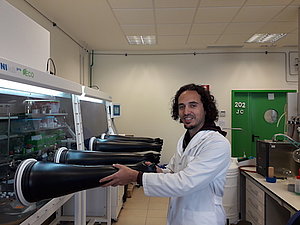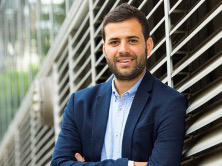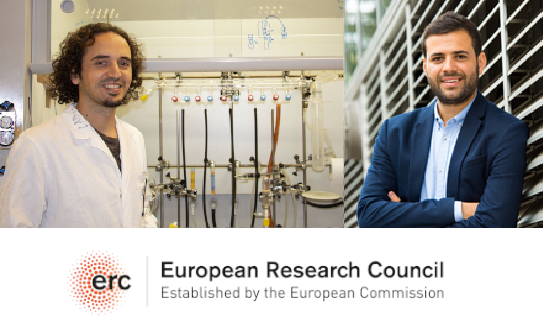Jesús Campos from IIQ and Tomás Ramírez from ICMS receive Consolidator Grants from the European Research Council, worth two million euros over five years for each project.
Two cicCartuja research projects have obtained Consolidator Grants awarded by the European Research Council (ERC). The BIMETALGAS project led by Jesús Campos from the Institute of Chemical Research aims to create catalysts capable of transforming gases into valuable chemical products and the CLEVER-FUEL project led by Tomás Ramírez from the ICMS designed to open new horizons in bioenergy research.
BIMETALGAS project aims is to develop innovative molecular tools (catalysts) capable of transforming three very common gases – carbon dioxide (CO₂), nitrous oxide (N₂O) and ammonia (NH₃) – into valuable chemical products. “These gases are cheap and abundant, but chemically very stable, which makes their use in chemical synthesis difficult. This project aims to design molecular systems based on the cooperation between various metals that are capable of activating the reactivity of these gases. This aims to revolutionise their use, thus laying the foundations for greener and more efficient chemical processes,” says Jesús Campos, a CSIC scientist at the IIQ.
According to the scientist, BIMETALGAS could have a significant impact on the sustainability of the chemical industry since the catalysts developed will lay the foundations for future production of essential molecules such as fertilizers, drugs or polymers, using cheap and abundant gases. “This approach would help to significantly reduce dependence on fossil fuels for chemical synthesis and to minimize industrial waste, by transforming harmful or inert gases into valuable resources,” adds Campos. “It is also a fundamental science project that will develop completely unexplored molecular systems, leading to the discovery of new unexpected chemical transformations, as well as their application in the valorization of other inert molecules.”

The CLEVER-FUEL project proposes a revolutionary approach to biofuel production. The research strategy is based on a completely novel route to produce deoxygenated hydrocarbons, which are very important compounds in the chemical and fuel processing industries, by designing advanced catalysts that allow integrating hydrogen generation from water and hydrocarbon deoxygenation reactions to obtain biofuels in a single stage.
CLEVER-FUEL will combine the design of multifunctional catalysts with advanced characterisation techniques, allowing the mechanisms of these complex reactions to be unravelled and the formulation of the catalysts that are at the heart of these processes to be optimised. Furthermore, CLEVER-FUEL will apply innovative concepts in reaction engineering using microchannel catalytic reactors that facilitate process intensification and would enable the development of on-site processing plants for delocalised applications. For example, a solution could be found for agricultural waste and biofuels could be produced from it, turning “a problem, waste, into an opportunity: biofuels”, highlights Tomás Ramírez.
CLEVER-FUEL therefore represents a cutting-edge concept in catalysis and reaction engineering and is designed to open up new horizons in bioenergy research, offering chemical solutions to major current challenges facing society, such as climate change, the decarbonisation of transport and the transition to a future with low greenhouse gas emissions.

These grants, which are part of the European Union’s Horizon Europe programme, are endowed with two million euros for each project over the next five years. They are aimed at researchers with between 7 and 12 years of experience who want to consolidate their research group and have an interesting project proposal to develop their most promising scientific ideas.



